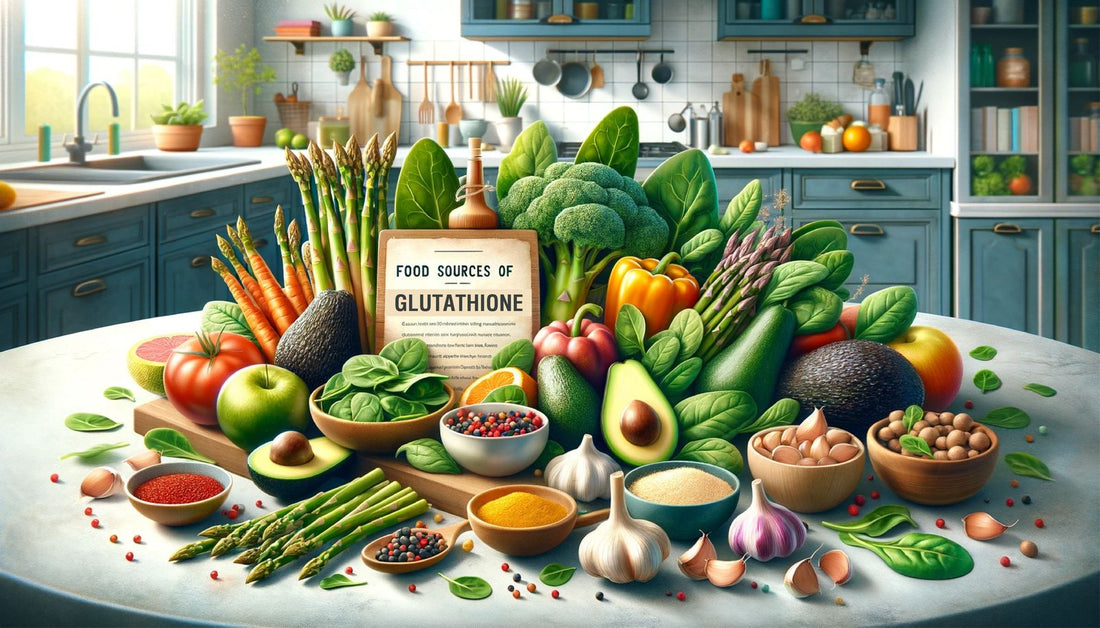

Food Sources of Glutathione: Incorporating Natural Sources into Your Diet
Table of Contents
Glutathione is a powerful antioxidant that plays a crucial role in maintaining good health and preventing chronic diseases. It's naturally produced by the body, but you can also find it in certain foods.
In this blog post, we will discuss what glutathione is and the foods that are high in this essential nutrient. From cruciferous vegetables to nuts and seeds, we have provided an extensive list of food sources that contain glutathione.
So, if you're looking for natural ways to boost your body's glutathione levels, keep reading!
What is Glutathione?
Glutathione, a master antioxidant, plays a vital role in safeguarding cells against oxidative stress. This amino acid is naturally produced in the body and helps enhance the immune system while detoxifying harmful free radicals.
What Happens When You Stop Taking Glutathione (Check Here)
What happens when you start taking glutathione (Check Here)
Top Food Sources of Glutathione
Cruciferous Vegetables
Cruciferous vegetables, such as broccoli and Brussels sprouts, provide abundant glutathione precursors essential for promoting glutathione synthesis. These active compounds contribute to the body's ability to produce glutathione, supporting overall health and well-being.
- Provide abundant glutathione precursors
- Enhance glutathione synthesis
- Maintain glutathione peroxidase levels
- Reduce the risk of chronic diseases
Incorporating cruciferous vegetables into your diet can help enhance levels of glutathione, the master antioxidant that protects cells from oxidative damage. Including these vegetables in your meals can potentially aid in maintaining glutathione peroxidase levels and reducing the risk of chronic diseases.
Nuts and Seeds
Walnuts and sunflower seeds, with their glutathione cofactor properties, are valuable for maintaining healthy glutathione levels. Including a variety of nuts and seeds in your diet can aid in supporting the levels of glutathione, the master antioxidant that plays a crucial role in protecting cells from oxidative damage.
- Contain glutathione cofactor properties
- Support glutathione levels
- Enhance glutathione production
Research suggests that these foods may also help in enhancing glutathione production in the body, thus contributing to overall health benefits.
Fruits
Citrus fruits, like oranges and grapefruits, play a crucial role in glutathione synthesis due to their high vitamin C content. These fruits are essential for maintaining adequate levels of glutathione, the master antioxidant known for its health benefits in preventing cell damage and oxidative stress.
- Citrus fruits provide vitamin C, essential for glutathione synthesis
- Avocados contain glutathione precursors, supporting glutathione metabolism
Additionally, avocados, a fruit rich in glutathione precursors, can contribute to the metabolism of glutathione in the body, supporting overall health and well-being.

Herbs and Spices
Boosting levels of glutathione can be supported by incorporating herbs like milk thistle and antioxidant-rich spices such as turmeric into your meals. These natural ingredients have been known for their potential to enhance glutathione activity, aiding in the body's defense against cell damage and oxidative stress.
- Milk thistle boosts glutathione activity
- Antioxidant-rich spices like turmeric enhance glutathione activity
- Maintain healthy levels of glutathione
Including these herbs and spices in your diet can contribute to maintaining healthy levels of this master antioxidant, supporting overall health and well-being.
Meat and Fish
Lean protein sources like meat provide essential amino acids for glutathione production. Additionally, certain fish varieties, such as salmon and mackerel, offer glutathione precursors, promoting overall health.
- Lean protein sources provide essential amino acids for glutathione production
- Fish like salmon and mackerel offer glutathione precursors
Incorporating these meat and fish options into your diet can help support the levels of glutathione, the master antioxidant that plays a crucial role in protecting cells from oxidative damage and maintaining overall health.
Dairy Products
Dairy products, including milk and yogurt, provide vital nutrients for the synthesis of glutathione, aiding in maintaining balanced glutathione concentrations. Incorporating these products into your diet can contribute to the levels of glutathione in your body.
- Provide vital nutrients for glutathione synthesis
- Help maintain balanced glutathione concentrations
- Contribute to glutathione levels in the body
- Supply essential building blocks for glutathione activity
- Protect against oxidative damage
- Promote overall health
Consuming dairy products ensures the supply of essential building blocks that support glutathione activity, helping protect against oxidative damage and promoting overall health.
Legumes
Incorporating lentils and chickpeas into meals can aid in optimizing glutathione supply in the body, as legumes contain glutathione precursors that support immune function. By including legumes in your diet, you can enhance the levels of glutathione and promote overall health.
- Contain glutathione precursors that support immune function
- Enhance glutathione levels
- Provide building blocks for glutathione production
These natural sources also provide building blocks for glutathione production, contributing to the body's antioxidant defenses.

Grains
Including a variety of whole grains, such as brown rice and quinoa, in your diet can potentially support the levels of glutathione, a master antioxidant essential for health. These whole grains are rich in glutathione precursors, contributing to overall glutathione levels and protecting against oxidative damage.
- Rich in glutathione precursors
- Protective against oxidative damage
- Enhanced glutathione synthesis
By incorporating grains into your meals, you can promote the synthesis of glutathione and potentially enhance its health benefits in the body.
Fermented Foods
Incorporating fermented foods such as kimchi, sauerkraut, and kefir into your diet can significantly boost glutathione levels. Fermentation enhances the bioavailability of glutathione, supporting its absorption in the body.
- Significantly boost glutathione levels
- Enhance glutathione bioavailability
- Enrich gut health
- Strengthen the immune system
Moreover, consuming fermented foods not only enriches gut health but also strengthens the immune system. Whether as part of meals or snacks, these high-quality, unpasteurized options provide a convenient way to optimize glutathione levels and overall well-being.
What are the benefits of glutathione? (Check Here)
What to Avoid When Taking Glutathione? (Check Here)
Let’s Sum Up
Incorporating glutathione-rich foods into your diet is essential for maintaining optimal health and supporting your body's natural detoxification process. By including a variety of fruits, vegetables, nuts, seeds, and lean proteins in your meals, you can increase your intake of this powerful antioxidant.
Consider adding cruciferous vegetables like broccoli and cauliflower, as well as herbs and spices like turmeric and garlic, to your dishes. Additionally, opt for fermented foods like sauerkraut and kimchi to promote a healthy gut microbiome. Remember, a well-rounded and balanced diet is key to ensuring you're getting all the nutrients your body needs.
So, start incorporating these glutathione-rich foods into your daily meals and reap the benefits of improved detoxification and overall well-being.


















